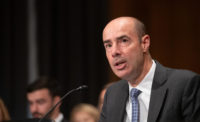Obama Picks Charlotte, N.C., Mayor to Head DOT
Moving to fill one of the few remaining Cabinet vacancies for his second term, President Obama announced on April 29 that he will nominate Charlotte, N.C., Mayor Anthony Foxx to lead the U.S. Dept. of Transportation.
 |
| Foxx |
In addition, DOT like all federal agencies, will continue to face severe near-term pressure on its annual appropriations, making increases in construction accounts hard to achieve.
Obama said Foxx will be “extraordinarily effective” at DOT. Obama noted that since Foxx became mayor, ground was broken on a new downtown streetcar line, Charlotte Douglas International Airport has been expanding and the region is working on an extension of its six-year-old light rail line.
Obama also reiterated his oft-stated call for improving U.S. public works. “We need to modernize the infrastructure that powers our economy,” he said, including more high-speed rail as well as bridges, tunnels and ports.
In 2009, Foxx was elected Charlotte’s second African-American mayor, after serving two terms on the city council, where he chaired the transportation committee.
Foxx is now in his second, two-year term as mayor. Earlier this month, in a move that the Charlotte Observer said “rocked” the city, he said he would not run for re-election.
A graduate of Davidson College and New York University’s law school, Foxx was a trial attorney in the Justice Dept.’s civil rights division and staff counsel to the House Judiciary Committee. He later was an attorney with the law firm Hunton & Williams and in 2009 became deputy general counsel of DesignLine Corp., a Charlotte-based maker of hybrid buses.
If confirmed, Foxx would succeed Ray LaHood, who has held the top DOT post since 2009. LaHood announced on Jan. 29 that he would step down when a successor is confirmed.
Senate commerce committee Chairman Jay Rockefeller (D-W.Va.) hailed Obama's choice and said he plans to move Foxx’s nomination through his panel “as soon as possible.”
Sen. John Thune (S.D.), the commerce committee’s top Republican said he would review Foxx’s record and would work with Rockefeller “to ensure the confirmation process is fair and thorough.”
Industry groups praised Foxx’s selection, but noted that critical issues are ahead, particularly funding. The Highway Trust Fund's highway account is projected to fall into the red after September 2014, when the current surface-transportation bill, MAP-21, expires.
Stephen Sandherr, Associated General Contractors of America CEO, said that Foxx “has a unique opportunity to promote new sources of revenue to address chronic shortfalls in federal funding for our aging network of highways, bridges, airports and transit systems.”
Sandherr also called for implementing the 2012 highway-transit bill’s provisions aimed at speeding project reviews.
Bud Wright, American Association of State Highway and Transportation Officials executive director, also cited “identifying a long-term sustainable transportation funding source” as a key issue.
American Public Transportation Association President and CEO Michael Melaniphy said in an interview that the major challenges facing Foxx include a “long-term funding solution and the reauthorization so that you’ve got adequate funding for the Highway Trust Fund mass transit account in the successor of MAP-21.” He adds, “Everything else is much lower on the list.”
Melaniphy, general manager of Charlotte Transit from the late 1990s to 2001, said, “I think that Charlotte has really embraced the notion that you have to give citizens options and that by giving them options, your city moves more freely when you take cars off the road…transit allows goods and services to move more freely about your streets and your city can work and flow better.”
He adds, “And the fact that the mayor has been involved with all the different [modes]—aviation and roads and transit…I think will serve him well as he moves into his role following confirmation as the Secretary.”
American Road & Transportation Builders Association CEO Peter Ruane agreed that Foxx has had a broad transportation background. Ruane said Foxx “has been a thoughtful voice in advocating for development of all modes of transportation in order to help spur the local economy, create jobs and improve mobility.”



